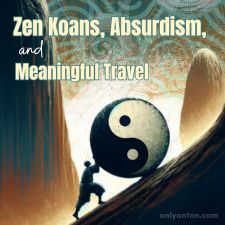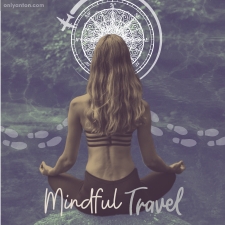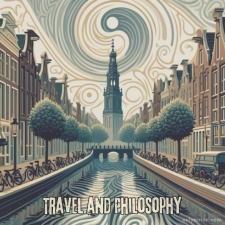Show me the view from a mountain you have not yet climbed.
Introduction
In the realm of modern travel, where the pursuit of new experiences often competes with the demands of a fast-paced world, the philosophies of Zen Buddhism and Absurdism offer profound insights. Zen koans, Absurdism, and meaningful travel converge to create a framework that challenges conventional thinking and promotes a more mindful approach to life. These philosophies, each in their own way, encourage travellers to slow down, reflect deeply, and engage more fully with their surroundings.
With their paradoxical nature, Zen koans prompt practitioners to look beyond logical reasoning to experience reality directly. Meanwhile, Absurdism, as articulated by Albert Camus, highlights the conflict between our search for meaning and the universe’s indifference. Together, these perspectives foster an open, present, and receptive mindset to the moment’s richness.
This post explores lessons from Zen koans and Absurdism and applies them to mindful travel. Examining these philosophical insights can enhance our travel experiences and help us find deeper fulfillment in our journeys. The four main lessons discussed are embracing the present moment, letting go of preconceptions, finding value in the journey, and cultivating a beginner’s mind.
As we delve into these lessons, you will discover practical tips and philosophical reflections that can transform your travel experience. Embrace the present moment to experience your surroundings fully. Let go of preconceptions to open yourself to new perspectives. Find value in the journey to appreciate every step. Cultivate a beginner’s mind to keep your sense of wonder alive. Join me in uncovering how Zen koans and Absurdism can lead to more mindful and meaningful travel adventures.
Understanding Zen Koans
Zen koans are paradoxical statements or questions used in Zen Buddhism to provoke deep contemplation and insight. They are designed to transcend conventional logical reasoning and lead practitioners to a direct experience of reality. A koan often presents a scenario that defies logical explanation. An example is the famous question, “What is the sound of one hand clapping?” By meditating on such a koan, practitioners are encouraged to break free from habitual thought patterns. Doing so enables one to gain a deeper, more intuitive understanding of the nature of existence. Koans play a crucial role in Zen practice, guiding individuals towards enlightenment by challenging their perceptions and encouraging profound self-inquiry.
Understanding Absurdism
Absurdism is a philosophical perspective most closely associated with the work of Albert Camus. This philosophy explores the inherent conflict between humans’ desire for meaning and the universe’s apparent lack of intrinsic meaning. In his seminal essay “The Myth of Sisyphus,” Camus describes the human condition as fundamentally absurd. He uses the Greek myth of Sisyphus, who is condemned to eternally push a boulder up a hill only for it to roll back down each time he reaches the summit, as a metaphor for the human condition. Despite this seemingly futile endeavour, Camus suggests that one must imagine Sisyphus happy. That is, Sisphysus may find fulfillment in the struggle itself rather than in any ultimate purpose. Absurdism thus encourages individuals to confront the absurdity of life and embrace it, finding joy and meaning in the present moment and in the act of living itself.
If you arrive before you depart, where have you travelled?
Lesson One: Embrace the Present Moment
Zen Buddhism Perspective
Zen Buddhism places a profound emphasis on living fully in the present moment. This practice, known as mindfulness or “zazen” (sitting meditation), encourages individuals to experience life as it unfolds, free from the distractions of past regrets or future anxieties. The essence of Zen is to see reality directly and purely, without the filters of preconceived notions or habitual thought patterns. One of Zen’s primary tools to cultivate this awareness is the koan—a paradoxical statement or question designed to provoke deep contemplation and insight.
A well-known example of a Zen koan is, “What is the sound of one hand clapping?” At first glance, this question seems nonsensical, as clapping is typically a two-handed action. However, the purpose of this koan is not to seek a logical answer. The point is to push the practitioner beyond conventional thinking. Individuals are encouraged to transcend rational thought and engage with the present moment directly and intuitively by meditating on such a koan. This practice helps break down mental barriers, and fosters heightened awareness and presence.

Absurdist Perspective
Absurdism, as articulated by Albert Camus, explores the inherent conflict between humans’ desire for meaning and the universe’s apparent lack of intrinsic meaning. In “The Myth of Sisyphus,” Camus suggests that one must imagine Sisyphus happy, finding joy in the struggle itself rather than in any ultimate purpose. This emphasis on confronting the absurdity of life and embracing the present moment aligns closely with Zen principles. Absurdism encourages individuals to let go of the quest for inherent meaning and instead focus on the experiences and joys of the present.
Application to Travel
Applying the wisdom of Zen Buddhism and Absurdism to travel can lead to more enriching and mindful experiences. Here are some practical tips for travellers to stay present:
- Practice Mindfulness: Engage in mindfulness practices such as meditation or deep breathing exercises. Take a few moments each day to sit quietly. Focus on your breath. Bring your attention to the present moment. These practices help center your mind and enhance your awareness of your surroundings.
- Conscious Engagement: Make a conscious effort to engage with your environment fully. Whether exploring a busy city or a tranquil natural landscape, pay attention to the sights, sounds, smells, and sensations around you. Take your time to observe and appreciate the details, fully immersing yourself in the experience.
- Slow Down: Resist the urge to rush through your itinerary. Instead, slow down and savour each moment. Spend extra time at a single location. Take leisurely walks. Allow yourself to linger in places that captivate your interest. These suggestions can help you connect deeply with your surroundings and create lasting memories.
- Let Go of Expectations: Approach your travels with an open mind and let go of rigid expectations. Embrace spontaneity and be open to the unexpected. By relinquishing control and accepting whatever comes your way, you can find joy and meaning in the journey itself.
By embracing the present moment, travellers can transform their journeys into profound and meaningful experiences enriched by the deep awareness and joy of living in the now.
Two paths diverge, yet you stand still. Which journey do you take?
Lesson Two: Let Go of Preconceptions
Zen Buddhism Perspective
Zen Buddhism emphasizes the importance of letting go of preconceptions and approaching the world with fresh, unclouded eyes. One way Zen achieves this is through the use of koans, which challenge conventional thinking and invite practitioners to experience reality directly. These paradoxical statements or questions disrupt habitual thought patterns, encouraging a state of open-mindedness and receptivity.
An illustrative example is the koan, “Look at the flower, and the flower also looks.” This koan challenges the dualistic thinking that separates the observer from the observed. Meditation on this statement prompts practitioners to see the interconnectedness of all things and experience the world beyond their preconceived notions and judgments. This fresh perspective allows for a deeper, more immediate connection with reality.
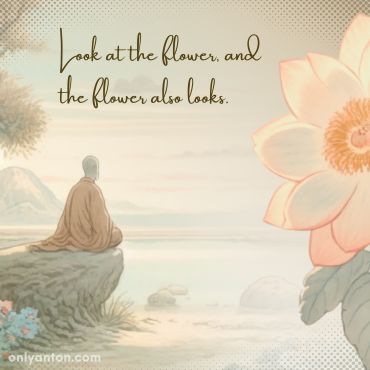
Absurdist Perspective
Absurdism also advocates for letting go of rigid expectations and embracing life as it is. Camus’ philosophy centers on the idea that the universe lacks inherent meaning, and our relentless search for purpose can often lead to frustration and despair. However, by acknowledging the absurdity of this pursuit, individuals can liberate themselves from the confines of rigid expectations.
Camus suggests that recognizing life’s meaninglessness frees us from the burden of constantly seeking validation or purpose in our actions. Instead, it allows us to approach life with an open mind and heart, finding joy in the present moment and the experiences that come our way. This perspective encourages a form of radical acceptance, where one can fully engage with life without the constraints of preconceived notions or expectations.
Personal Anecdote
While travelling around the Netherlands last summer, I meticulously planned my itinerary after finishing a stint at a Dutch language school. I intended to visit Den Bosch, but on the day I planned to go, the rail lines were unexpectedly closed. Additionally, I had other destinations in mind, such as Amersfoort. However, life had different plans for me.
A Belgian friend, living and working in China, was returning to Belgium for a few weeks. Seizing this spontaneous opportunity, I cancelled my hotel reservations and arranged transportation to Brussels instead. I spent a few delightful days with him in his hometown in Belgium. This unplanned detour enriched my journey in ways I could never have anticipated, highlighting the value of letting go of rigid plans and embracing the unexpected.
Application to Travel
Applying the wisdom of Zen Buddhism and Absurdism to travel can significantly enhance the richness and depth of the experience. Here are some practical tips for travellers to let go of preconceptions:
- Approach New Cultures with Curiosity: When visiting a new place, approach the local culture with genuine curiosity and openness. Instead of judging or comparing it to your own culture, take the time to learn and understand the traditions, values, and ways of life of the people you meet. This change in perspective can lead to more meaningful interactions and a deeper appreciation of the diversity of human experience.
- Embrace Uncertainty: Travel often involves uncertainty and unexpected events. Embrace these moments as opportunities for growth and discovery rather than as inconveniences. Letting go of the need for control can make your journey more enjoyable and enlightening.
- Practice Active Listening: When engaging with locals or fellow travellers, practice active listening. Pay full attention to their stories and perspectives without immediately forming judgments or responses. These practices can help you gain new insights and broaden your understanding of the world.
- Let Go of Itineraries: While planning is essential, be flexible with your itinerary. Allow yourself the freedom to deviate from the planned path and explore spontaneous opportunities that arise. This openness can lead to unexpected and enriching experiences.
By letting go of preconceptions and embracing a mindset of openness and curiosity, travellers can transform their journeys into profound explorations of the world and themselves. This approach enriches the travel experience and fosters a deeper connection with the people and places encountered along the way.
What is the sound of footsteps in a place you’ve never been?
Lesson Three: Finding Value in the Journey
Zen Buddhism Perspective
Zen Buddhism teaches that the process is as important, if not more important, than the goal. This principle is vividly illustrated in the practice of zazen, or sitting meditation. In zazen, practitioners sit in a specific posture, focusing on their breath and the act of sitting itself. The aim is not to achieve a particular state of enlightenment but to fully experience each moment of the practice. This approach emphasizes that every step of the journey is valuable and that enlightenment is to be found in the here and now rather than as a distant goal.
The practice of zazen teaches practitioners to appreciate the simplicity and depth of each moment, fostering a deep sense of presence and awareness. It underscores the importance of engaging fully with whatever one is doing, recognizing that each moment holds its own significance. By focusing on the process, Zen encourages a mindful engagement with life, where the journey itself becomes a source of fulfillment.
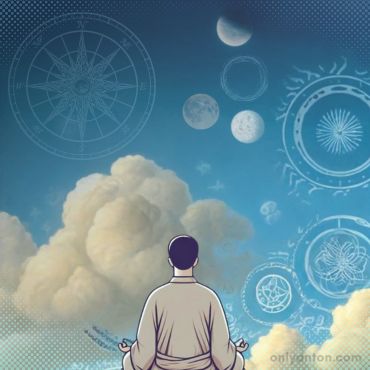
Absurdist Perspective
Absurdism, particularly as explored by Albert Camus, also emphasizes finding value in the journey itself. Referring to his idea in “The Myth of Sisyphus,” Camus suggests that one must imagine Sisyphus happy. In other words, even though Sisyphus’s labour is never-ending and seems pointless, Sisyphus can still find happiness by embracing his situation and finding purpose in the act of pushing the boulder itself.
The key insight here is that fulfillment and meaning are found not in the achievement of a final goal but in the struggle and effort involved in the journey. This idea encourages us to shift our focus from seeking ultimate meaning or success to appreciating the effort and experiences that come with striving. It promotes a mindset that values the process and finds fulfillment in the act of living.
Personal Anecdote
A colleague once invited me to attend an equestrian fashion show for kids. The show was part of the celebrations for opening a new children’s equestrian centre on the top floor of a mall in downtown Shaoxing, China. It was a surreal experience:
- Taking an elevator to the mall’s top floor.
- Walking out onto the open rooftop.
- Seeing a corral where children were learning how to ride horses.
The fashion show itself was absurd. Small children sporting jodhpurs, riding jackets, boots, and crops strutted down the catwalk to pumping house music. I even got to meet a famous actor from Chinese dramatic television. This unexpected and surreal experience reminded me that some of the most memorable travel moments come from embracing the journey, with all its quirks and surprises, rather than focusing solely on the destination.
Application to Travel
Applying the wisdom of Zen Buddhism and Absurdism to travel can transform the experience into a more enriching and meaningful journey. Here are some practical tips on appreciating every aspect of travel, including challenges and unexpected events:
- Embrace Challenges: View challenges and obstacles as integral parts of the travel experience. Whether navigating a foreign language, dealing with travel delays, or adjusting to a new culture, these moments can be opportunities for growth and learning. Embrace them with a positive attitude and a sense of curiosity.
- Appreciate Small Moments: Find joy in the small, everyday moments of travel. Whether you enjoy a cup of coffee at a local café, watch a sunset, or have a conversation with a stranger, these moments can be deeply fulfilling when fully appreciated.
- Stay Present in the Journey: Focus on the present moment rather than constantly thinking about the next destination or activity. Practice mindfulness by paying attention to your surroundings, engaging your senses, and immersing yourself in the experience.
- Be Open to the Unexpected: Travel often brings unexpected events and detours. Instead of seeing these as disruptions, view them as opportunities for adventure and new experiences. Being open to the unexpected can lead to some of the most memorable and rewarding travel moments.
- Reflect on Your Experiences: Take time to reflect on your travel experiences and what you have learned from them. Keeping a travel journal or sharing stories with others can deepen your appreciation for the journey and the personal growth it brings.
By finding value in the journey itself and embracing both the challenges and joys of travel, you can cultivate a more mindful and fulfilling travel experience. This approach encourages a deeper connection with the world around you and a greater appreciation for the richness of each moment.
When you carry no baggage, what do you bring on your journey?
Lesson Four: Cultivating a Beginner’s Mind
Zen Buddhism Perspective
In Zen Buddhism, the concept of “shoshin,” or beginner’s mind, is a foundational principle. Shoshin refers to having an attitude of openness, eagerness, and a lack of preconceptions when studying a subject or engaging in any activity, even at an advanced level, just as a beginner would. This mindset allows practitioners to approach each experience as if for the first time, free from the constraints of past knowledge and expectations.
A well-known story illustrating this concept involves a Zen master and a student. The master invites the student for tea and begins pouring tea into the student’s cup. Even after the cup is full, the master continues to pour, causing the tea to overflow. The student exclaims, “The cup is full! No more can go in!” The master replies, “Like this cup, you are full of your own opinions and speculations. How can I show you Zen unless you first empty your cup?” This story emphasizes the importance of emptying one’s mind of preconceptions to be genuinely open to new learning and experiences.
A classic example of cultivating a beginner’s mind is the practice of “kinhin” (walking meditation). In kinhin, practitioners walk slowly and deliberately, paying close attention to each step and the sensations of walking. By focusing on the present moment and the act of walking itself, they can experience each step with fresh awareness and curiosity. This practice helps one break free from habitual thinking and encourages a deeper connection with the present moment.

Absurdist Perspective
Absurdism, as articulated by Albert Camus, also encourages a perpetual state of curiosity and exploration. Absurdism acknowledges the inherent lack of meaning in the universe but suggests that this realization frees us to continuously seek new experiences and explore the world with fresh eyes. Camus advocates for embracing the absurdity of life and finding joy in the continuous search for new experiences and understanding.
This perpetual curiosity aligns with the idea of maintaining a beginner’s mind. By accepting that there is no ultimate meaning to be found, Absurdism encourages individuals to remain open and curious, always seeking to learn and experience more without being weighed down by preconceived notions or expectations. This mindset fosters a sense of wonder and an ongoing engagement with life.
Personal Anecdote
Embracing a beginner’s mind has led me to some of my most memorable and unexpected experiences. I’ve played bass in a band of foreigners performing in local Chinese bars simply because the opportunity arose. I took bagpipe lessons at a community college on a whim just because the evening course was available and seemed fun. Thanks to a friend who worked there and invited me along, I was interviewed on a radio station in Kristiansand, Norway.
I even participated in filming a promotional video for a traditional restaurant in Shaoxing and did voiceover work for an instructional video for the Chinese Exit and Entry Administration. Additionally, I’ve edited and polished English translations of Chinese academic texts. These experiences only occurred because I was open to new opportunities and said yes when they presented themselves, regardless of how unusual they seemed.
Application to Travel
Applying the wisdom of shoshin and Absurdism to travel can lead to richer and more meaningful experiences. Here are some practical tips for maintaining a sense of wonder and curiosity throughout one’s travels:
- Approach Each Destination with Fresh Eyes: No matter how many places you have visited, approach each new destination as if it’s your first time travelling. Be open to the unique aspects of each place and resist the urge to compare it to previous experiences. This openness can help you fully engage with and appreciate each location’s uniqueness.
- Engage in Local Customs and Practices: Take the time to learn about and participate in local customs and traditions. Whether you try new foods, attend local festivals, or engage in traditional practices, immersing yourself in the local culture with a sense of curiosity and respect can deepen your travel experience.
- Ask Questions and Listen: Cultivate a habit of asking questions and genuinely listening to the answers. Whether you’re talking to locals or fellow travellers, show interest in their stories and perspectives. This practice can lead to meaningful interactions and a deeper understanding of the places you visit.
- Embrace the Unknown: Allow yourself to get lost, explore off the beaten path, and embrace the unexpected. Sometimes, the most memorable experiences come from unplanned adventures and serendipitous encounters. Keep an open mind and be willing to deviate from your planned itinerary.
- Reflect and Document: Keep a travel journal or take notes on your experiences. Reflect on what you’ve learned and how each new experience has shaped your understanding of the world. Documenting your travels can help you maintain a sense of wonder and curiosity even after the trip has ended.
Travellers can experience the world with a sense of wonder and openness by cultivating a beginner’s mind and embracing perpetual curiosity. This approach enriches the travel experience and fosters personal growth and a deeper connection with the diversity of human life.
A map shows many roads, yet none lead to where you are. How do you navigate?
Conclusion
In this exploration of Zen koans, Absurdism, and meaningful travel, we have delved into how these philosophies offer profound insights for enhancing our travel experiences. By embracing the present moment, letting go of preconceptions, finding value in the journey, and cultivating a beginner’s mind, we can transform how we engage with the world.
Embracing the Present
First, we looked at the importance of embracing the present moment. Zen Buddhism teaches us to live fully in the now through practices like zazen. Absurdism encourages us to find joy in the present despite life’s inherent absurdity. Applying this wisdom to travel means being mindful and fully present, appreciating each moment of our journey.
Letting Go
Next, we discussed letting go of preconceptions. Zen koans challenge conventional thinking, prompting us to see the world with fresh eyes. Similarly, Absurdism promotes open-mindedness by accepting life’s lack of inherent meaning. As travellers, letting go of preconceptions allows us to approach new cultures and experiences with curiosity and openness.
The Journey Itself
We then explored finding value in the journey itself. Zen Buddhism emphasizes the process over the goal, as seen in practices like zazen. Through Camus’ idea of imagining Sisyphus happy, Absurdism teaches us to find fulfillment in the struggle. In travel, this means appreciating every aspect of our journey, including challenges and unexpected events.
Beginner’s Mind
Finally, we examined cultivating a beginner’s mind. Zen’s concept of shoshin encourages an attitude of openness and eagerness, free from preconceptions. Absurdism similarly values perpetual curiosity and exploration. For travellers, maintaining a beginner’s mind means approaching each destination with wonder and curiosity, always ready to learn and experience something new.
By integrating these philosophies into our travel practices, we can cultivate more mindful and enriching travel experiences. These principles help us connect deeply with the places we visit and the people we meet, fostering personal growth and a richer understanding of the world.
As you plan your next travel adventure, I encourage you to apply these lessons. Embrace the present moment, let go of preconceptions, find value in the journey, and cultivate a beginner’s mind. Doing so will open you to the full spectrum of experiences travel has to offer, transforming each trip into a meaningful exploration of life.
I invite you to share your own experiences and mindful travel insights in the comments below. How have Zen Buddhism or Absurdism influenced your travel experiences? What practices help you stay present and open while exploring new places? Your stories and reflections can inspire and guide others on their journeys.
For those interested in delving deeper into Zen Buddhism and Absurdism, I have included a list of further reading and resources below. These materials can provide more comprehensive insights into these philosophies and their practical applications.
Further Reading and Resources
For those interested in diving deeper into the philosophies of Zen Buddhism and Absurdism, as well as their application to mindful travel, here are some recommended books, articles, and websites that provide valuable insights and information:
For more related to this topic, see my blog posts:
Books
- The Myth of Sisyphus by Albert Camus (2022, trans. Justin O’Brien): A seminal work in Absurdist philosophy, first published in French in 1942 and in English in 1955. This book explores the human quest for meaning and the inherent absurdity of life. Camus’ reflections on the myth of Sisyphus are particularly relevant to the themes discussed in this blog post. Look for it online, at a local library, or purchase it here.
- Zen Mind, Beginner’s Mind by Shunryu Suzuki (2020): This 50th anniversary edition of the 1970 classic text on Zen Buddhism offers insights into the practice of maintaining a beginner’s mind. Suzuki’s teachings emphasize the importance of mindfulness and openness. Read it online, borrow it, or buy it online here.
- Master Dogen’s Zazen Meditation Handbook by Eihei Dogen (2022): The definitive English translation of Bendowa, a foundational work of Zen Buddhism written by Eihei Dogen in 1231. It contains the master’s essential teachings on zazen or seated meditation. Read it online, borrow it, or buy it online here.
Articles and Blog Posts
- “Zazen Instructions: How to Meditate”: An article from the Zen Mountain Monastery that delves into the practice of zazen in Zen Buddhism, explaining postures and meditation instructions. Read the article here.
- “Albert Camus on why accepting absurdity is the start of a fruitful life” by Scotty Hendricks, Big Think (Feb. 2021): A blog post that explores the core tenets of Absurdism and its applications in everyday life, with a focus on the works of Albert Camus. Visit the blog post here.
- “Why and How to Practice the Beginner’s Mindset” by Michelle Braden, Forbes (June 2023): This article lays out some of the most important benefits of having a beginner’s mindset. Read it online here.
Websites
- Wikipedia, “Zen Koan”: A detailed Wikipedia entry that covers the history, purpose, and examples of Zen koans. Find the entry here.
- Wikipedia, “Absurdism”: An overview of Absurdism, the arguments for and against it, and its relation to other philosophies such as Existentialism and Nihilism. Read the entry here.
- Stanford Encyclopedia of Philosophy, “Albert Camus”: A comprehensive resource on Albert Camus and his contributions to Absurdist philosophy. Visit the website here.
- Zen Studies Society: An organization dedicated to the study and practice of Zen Buddhism, offering resources, teachings, and information on Zen practices such as zazen and koans. Visit the website here.
